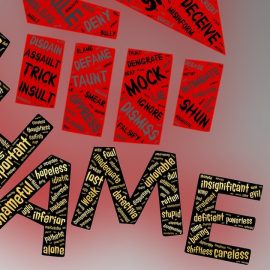

This article is an excerpt from the Shortform book guide to "The Righteous Mind" by Jonathan Haidt. Shortform has the world's best summaries and analyses of books you should be reading.
Like this article? Sign up for a free trial here .
Why do humans have a tendency toward group cooperation? Is it always a good thing?
People are groupish. We love to gather with others, and we often thrive on group cooperation. Social psychologist Jonathan Haidt argues that group cooperation and morality go hand in hand. While groupishness can lead to negative tribal thinking, it also can help us rise above detrimental self-interest.
Read more to learn about the evolution and implications of group cooperation.
Morality “Binds and Blinds” Us
At this point, you might be viewing morality cynically, believing that humans are inherently selfish and that morality is primarily self-serving and blinds us to reality—we make decisions with our guts and then rationalize them so well we think we made them using reason; we cheat when we think we won’t get caught and then convince ourselves we’re honest; we care more about others thinking we’re doing the right thing than we do about actually doing the right thing.
But this portrait of morality based solely on self-interest isn’t complete. In addition to being selfish, people are also groupish. We love to join groups—teams, clubs, political parties, religions, and so on. We are so happy to work with lots of others towards a common goal that we must be built for teamwork. We can’t fully understand morality until we understand the origin and implications of group cooperation and how our moralities bind us together, as well as blind us.
The Evolution of Group Cooperation
How did we become groupish? Darwin argued there are multiple reasons humans first banded together.
- First, we developed social instincts: Predators targeted loners more often than people who stayed close to the group.
- Second, we discovered reciprocity: People who helped others were helped in return.
- Third and most importantly, we developed a desire for social approval: People are concerned with what other people think of them and eager to find praise and avoid blame. People who lacked these traits were selected against because they couldn’t find mates or even friends.
Thus, evolution selects for people who act for the good of the group. Since Darwin’s time, researchers have found further evidence that humans do have groupish tendencies:
- Evolutionary Transitions: Biologists see eight clear examples of major evolutionary transitions in the last 4 billion years (from single-celled to multi-celled organisms, and so on). The final transition is the development of human societies. These transitions all move in the same direction—when individual units find ways to cooperate, selection begins to favor cohesive “superorganisms” or groups that can work together for success. Then these superorganisms begin to compete with one another and evolve for greater success, bringing about more groups.
- Same Interests: One of the human conditions that distinguishes us from other primates is called shared intentionality. At some point in our evolution, we learned that we would do better if we split up tasks. After this, collaborative groups got larger to defend themselves against other groups. Natural selection then favored more “group-mindedness.” Through developing a common understanding of norms and values, shared intentionality laid the groundwork for living in the societies full of moral matrices that we have today.
- Coevolution: Coevolution is the process by which species affect each other’s natural selection. Imagine two species—we’ll call them species A and species B. Species A is taking resources that both species need to survive and attacking species B. Species B then evolves to defend itself and develops an advantage over species A. In response, species A evolves to regain its original advantage. This is coevolution. Humans evolved to work together because other species were evolving to work together better as well. As part of their coevolution, humans developed shared intentionality in order to hunt together and share their resources. Humans also learned to domesticate animals in a group. Groups were forced to work together to keep cattle alive, which in turn helped them to win competitions with rival groups. A more group-friendly nature developed due to coevolution and replaced our more primal, selfish one, which has greatly influenced our ideas about what’s moral and what isn’t.
- Quick Evolution: Genetic evolution in the Holocene era, which started about 12,000 years ago, shows that humans were quickly exposed to new foods, climates, people, predators, and forms of warfare and social structures. This led to a population rise, as fewer humans died young, thanks to group cooperation, and they procreated more. Along with the population rise came opportunities for much more gene mutation. If genetic evolution was this fast, it’s possible that human nature could change in a few thousand years as well. Researchers theorize that human nature changed quickly at the realization that acting in groups would be beneficial to individual success.
Remember that while groupish thinking is part of our evolution, we are still mostly selfish and individual. We’re about 90 percent chimp, who is self-interested, and only 10 percent bee, who is group-interested.
Flipping the Switch to Group Mode
Humans have the ability to flip a switch from being that self-interested chimp to working like a group-interested bee. We’re only hive creatures in certain surroundings. There are probably times in your own life when you flip the switch from “chimp mode” to “bee mode”—maybe when you’re walking alone in nature and you feel removed from temporal worries and connected to the universe. Or perhaps you experienced the flipped switch while you were at a rave, dancing with others together and feeling a shared exaltation. Lots of hive behavior, like dancing together, comes naturally to humans and serves to break down social class and difference.
There are appeals to the hive all over. Successful corporations will make their employees’ jobs specific and also make them feel as if they’re contributing to the output of the company, thereby reinforcing a feeling of togetherness. Politicians also frequently employ the hive. Think about JFK’s “ask not what your country can do for you, but what you can do for your country.”
The most successful nations are ones with lots of little hives that cross with each other—someone can be part of a family unit, a workplace, a sports team outside of work, and on and on. In contrast, nations with no hives, or those with one huge hive, are much more likely to break down.
If we have a switch that allows group cooperation, and if we can be members of different hives simultaneously, it’s possible we can also flip the switch to act in certain situations according to a shared morality. This suggests that we can find common ground with one another and that our moral frameworks are not always set in stone.
The Cons (and Pros) of Group Cooperation
In sum, we have evolved to cooperate with members of our group and prevail over members of rival groups. Given our tendencies toward group cooperation, it’s not surprising that tribal thinking is so prevalent in modern society. We were not made to love everyone equally and unconditionally—rather, we were made to feel kinship with and loyalty to those with similar traits, and our righteousness springs from this tribalism.
For some, this idea is a depressing one. But, as we’ve seen, a lot of moral good comes out of our groupish behavior. Without tribes, there would be no community and no cooperation. Our groupishness pulls us out of our self-interested individualism and, for many, provides a higher purpose.

———End of Preview———
Like what you just read? Read the rest of the world's best book summary and analysis of Jonathan Haidt's "The Righteous Mind" at Shortform .
Here's what you'll find in our full The Righteous Mind summary :
- Why we all can't get along
- How our divergent moralities evolved
- How we can counter our natural self-righteousness to decrease political divides






